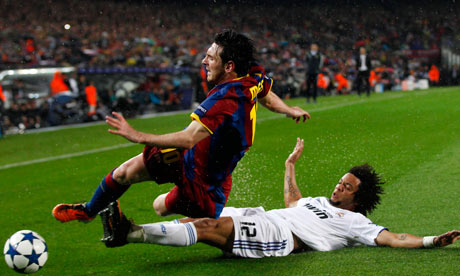
In August 1973, the Dutch footballer Johan Cruyff, then at the peak of his considerable powers, signed for Barcelona. He had been pursued by Real Madrid too, but spurned their advances by saying he would never play for a team "associated with Franco". To cement his hero-rebel status, Cruyff led his new club to a 5-0 away victory against Real Madrid and a few days afterwards, in February 1974, he named his newborn son Jordi. Sant Jordi is the patron saint of Catalonia and it was a pointed move as General Franco had not only banned the Catalan language but also outlawed Catalan names (Jorge being the preferred Spanish iteration of George).
Cruyff formed an immediate bond with Barcelona – he still lives in the city – but his decision also reflected a prevailing wisdom that Real Madrid were the team of the regime. They enjoyed favoured status and preferential treatment from Spanish administrators and referees, at least until General Franco died in his bed in late 1975 – or that was how the story went. Barcelona were oppressed and beaten down.
It is hard to think of Barcelona as underdogs any more. They have won the Spanish league three out of the last four years, and the Champions League twice in the same period. Their players dominate the Spain side that has lifted the last two European championships and the 2010 World Cup. It is often debated whether they are the greatest team ever to play the game.
And yet, when it comes to matches against Real Madrid, Barcelona still manage to remain the little guy, the neutral's favourite. Real Madrid are the galácticos, the name given to their annual raid of the world's greatest talent. Barcelona, meanwhile, are a hotchpotch assembled from home-grown, local kids inculcated at their vaunted youth academy, La Masia. The Spanish have a neat expression for the difference in philosophy: cantera versus cartera (youth system against wallet).
The idea of a David and Goliath struggle has a physical basis too. Barcelona's famous five frontline, led by La Masia-trained Lionel Messi, averages just 5ft 7in; a 2012 study by the Professional Football Players Observatory measured top-flight teams from 33 leagues and found that Barcelona's squad was the smallest. Real Madrid, revealingly, had the tallest players in La Liga. Throw in the fact that, in recent years, Barca forfeited millions to carry Unicef as their main shirt sponsor and the lines between good and evil are clearly drawn.
The fractious relationship between Real Madrid and Barcelona is picked apart and often challenged by Richard Fitzpatrick in his comprehensive, enlightening, though occasionally scattergun El Clásico (the name given to matches between the two teams). He calls it "football's greatest rivalry", and while that might not win him too many friends in Manchester or Glasgow, it will not be too contentious to non-partisan fans. As Sid Lowe, a Guardian and Observer writer, observes, the pair appear to spur each other to further excellence every season. "They are McEnroe and Borg, Coe and Ovett," he tells Fitzpatrick. "They are producing unbelievable statistics, partly because they have to."
The secret to any rivalry – as those examples from tennis and athletics remind us – is a clash of styles and ideologies. Although Real Madrid (signified by a raging bull) and Barcelona (represented by a Catalan donkey) have been playing each other for more than a century, Fitzpatrick observes that the intense competition is a relatively recent phenomenon. Real Madrid – the "royal" status was conferred in 1920 by King Alfonso XIII – have mostly been preoccupied with their el derbi clashes with cross-town rivals Atlético Madrid. Barcelona only established themselves as pretenders in the 1990s, when Cruyff had returned to manage the club and created a dream team that won the league six times in the decade.
Part of the reason the fixture has taken so long to become established is Spain's distinctive approach to fandom. Barcelona have around 173,000 members, but only a few hundred will travel to away games. "In England, people have really only got their football," explains John Carlin, an author and El Pais journalist who lives in Barcelona. "Here, they've got namby-pamby stuff like going to lunch with their grandmothers or going for a walk by the sea." One Barca fan tells Fitzpatrick that at el clásico matches fighting is more likely to break out between rightwing and leftwing factions of the same club than it is between rival sets of supporters.
Fitzpatrick's book is invaluable for the context that it gives a match that you might have watched superficially for years. It makes perfect sense, for example, that Real Madrid – the current home of José Mourinho and Cristiano Ronaldo – are historically known for their chuleria, a Spanish word for "arrogance" or "swagger" (contrast with Barca's star pairing, Messi and Pep Guardiola, who recently stepped down as manager, typically compared to seminarians). On the other side, the author, a Barcelona resident, neatly links the team's intricate play with the invention of Catalan chef Ferran Adrià, and with the phrase seny i rauxa: "common sense and madness".
Increasingly, however, the two behemoths have more in common than differences. Despite their ground-breaking academy, Barcelona actually spent more on transfers during the summer of 2011 than Real Madrid; they also now have a shirt-sponsorship deal with the Qatar Foundation that pays £25m a year for five years. La Liga is fast becoming an undesirable two-horse race: in 2011, the team that finished third, Valencia, were almost as close to the relegation zone as they were to Barcelona and Real Madrid out front. Both teams have a distressing rap sheet of racist incidents.
El clásico is the greatest show on Earth right now, but the fate of Glasgow's Rangers is a timely reminder that these rivalries do not always remain inviolable for ever.

